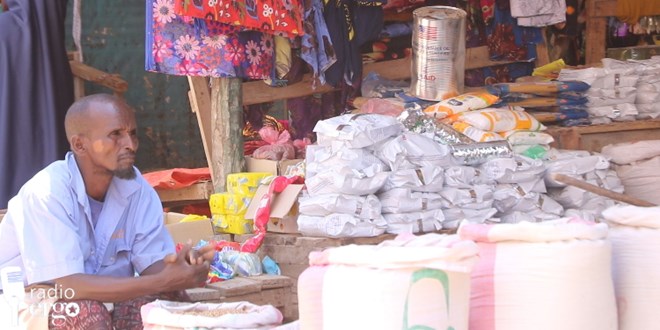
Saturday March 18, 2023

Dhaqane in his shop reselling food items/Abdirisak Ahmad/Ergo
(ERGO) – Prices of cereal grains and beans have dropped dramatically in Beledweyne, as Hiran farmers try to sell off their harvest cheaply locally due to their inability to sell their produce in Somaliland.
Trucks that normally transport food from Hiran to various markets in Somaliland have been grounded due to the inability to pass through Sool region, where conflict in the town of Lasanod has caused chaos and blocked roads.
Omar Mumin Osman, a farmer in Beledweyne, is counting losses after being unable to sell his harvest to the usual northern markets.
He has harvested 1,142 sacks of maize, beans, and sorghum from his 12 hectares of farmland but has only managed to sell 187 sacks for just $450.
“I invested in this farm over a long period thinking I would be able to pay off my investment, but it is getting hard now,” Omar told Radio Ergo.
“We used to earn good income selling food as it was even bought for consumption in Hargeisa. Now there is no one to buy our produce.”
Omar took a loan of $470 to buy seeds and fuel and took $250 on credit to buy food for his family. The lack of demand and consequent fall in prices has slashed his profit margin.
He and his wife and nine children live in a rental house costing $35 a month. He fears eviction after failing to pay rent for the last three months. He has also not paid school fees for his children over the same period, with an unpaid demand of $180.
“These issues worry me! If I don’t get buyers I don’t know what I will do with all this food. The little money I got was spent on paying the workers. I hope the market [in Somaliland] reopens soon, if it doesn’t I will have to auction off the food,” he said.
Some of Omar’s grain has still not been brought in from his farm and he is concerned it might rot. He began planting in October 2022, despite the drought, which deterred many other farmers from planting at all.
Dhaqane Amalow, a businessman who trades in grain, said he normally sells food grown in Hiran all over Somaliland including Hargeisa and Bosaso. The food surplus is now flooding local markets where this is not enough demand.
“The food crops have been harvested but there aren’t enough people to buy the food, so the prices of food have dropped. A kilo of maize was $35 now it’s down to $18. The price of beans was $90 and now it’s $65,” he explained.
Yusuf Ahmed Abdi used to drive food trucks up to Hargeisa. However, he has not travelled for a month due to fear of the conflict in Lasanod.
“You can understand someone who has not worked for a month, my only source of income is this vehicle, and it’s off the road now. It’s parked in a garage where they are charging me to keep it there,” he complained.
Yusuf drives a truck owned by his relatives and has been plying routes between Beledweyne and Somaliland for 15 years. The truck normally earns $5,000 a month and Yusuf keeps $500 for the five or so trips he makes.
As a father of 19, he has heavy responsibilities. Ten of his children are in primary and middle schools and he has not been able to pay their February school fees of $80.
“In a month I would normally travel four to five times, we wouldn’t stop. Sometimes we drove through Ethiopia, sometimes we went directly. This was how we made a living but now we have been affected and we just hope that the situation will return to normal,” he said.
Yusuf stated that some of his truck driver colleagues have been stuck in Hargeisa, whilst others like him are in Beledweyne without any work.